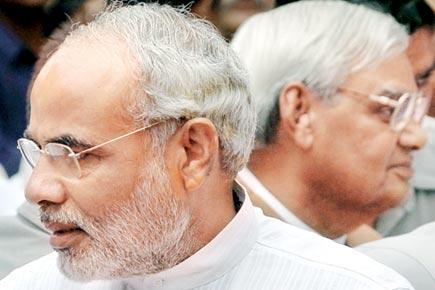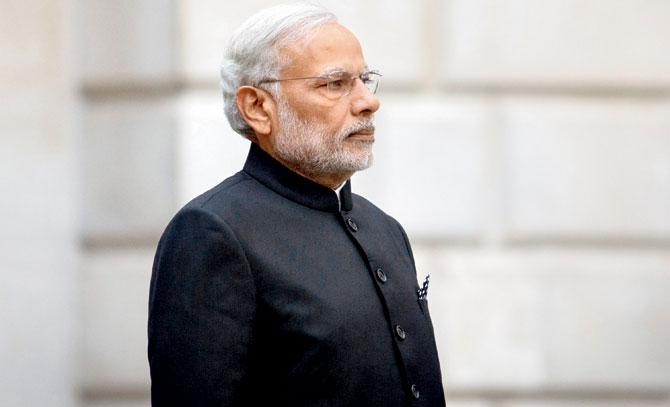Post the Bihar fallout, voices of dissent against PM Narendra Modi are growing louder in the BJP. And they are all saying the same thing: Atal Bihari Vajpayee was the better leader

ADVERTISEMENT
In the heat and dust enveloping Prime Minister Narendra Modi post his worst political setback is a single pressure point: A constant, growing comparison with predecessor Atal Behari Vajpayee.

Prime Minister Narendra Modi and former PM Atal Behari Vajpayee at the funeral of RSS leader H V Seshadri in Bangalore in August 2005. Pic/AFP
Political observers in the Indian capital say the comparison — triggered by a handful of party veterans and rebels-in-waiting — started much before the Bihar elections. At a recent meeting where the PM was present, senior RSS leader Krishna Gopal reminded party bigwigs of the way Vajpayee — PM between 1996, and then from 1998 to 2004 — ruled the nation, and more importantly, was “open to ideas and meeting the bitterest of critics”.
Also read: BJP MP Shatrughan Sinha backs veterans, demands for introspection
Gopal’s argument revolved around a single issue that he felt was impacting the cabinet’s work culture and the party’s performance: A fear factor revolving around Modi that never surfaced during Vajpayee’s regime. Top sources within the party agreed with Gopal’s contentions. They have been debating it themselves for long.
Consider this. At a recent cabinet meeting, telecom minister Ravi Shankar Prasad bore the burnt of Modi’s ire over the contentious issue of call drops. In fact, Modi was not even interested in listening to Prasad’s clarification that he had instructed officers to look into the issue. “The PM’s point of view was simple. Anyone can order. But someone needs to do the work. There was a deathly silence in the room,” said sources.
“The difference in his work culture and that of Vajpayee’s has been glaring. Vajpayee was a consensus leader; Modi’s style is more akin to that of Indira Gandhi, almost like the way a Mamata or Jayalalitha would run their show,” remarks Mohan Guruswamy, Delhi’s top political analyst. The late Pramod Mahajan had once linked Vajpayee’s leadership to that of an “oligarchy” because the veteran PM had a number of leaders — ranging from LK Advani to Yashwant Singh to Murali Manohar Joshi to George Fernandes — helping him understand the needs of the nation and its people.
Also read: Yashwant meets Advani; Gadkari wants action against 'irresponsible' remarks
Modi’s one-man-army approach is, expectedly, a far cry. Among the recent comparisons was his dependance on those without ground knowledge of Bihar. Something as primary as booking hoardings for BJP election propaganda kicked off almost a month after JD(U) had taken up all the sites. Also, then there is his handling of the media.

A recent “quote” on Dadri offered to the political editor of a regional language daily snowballed into a crisis when the RSS blamed Modi for offering that quote. The PM clarified that he had offered the “quote” for the daily and that too during a meeting to offer condolences for the editor’s mother who had expired recently. But, news channels twisted it, sought reactions from JD(U), Congress and other political parties.
“It would not have happened during Vajpayee’s time because Vajpayee was much more open to the media and handled some of its fiercest criticisms,” remarked Ajay Upadhyay, former editor of a Hindi daily.
Upadhyay was reminded of a chance meeting with Vajpayee who, once as the PM, told reporters to “have lunch and come back with your questions”. He was ready to answer all, only after a brief snack break. The reporters were over the moon. “Recriminations were swift within his party but handled in style,” remarked Upadhyay.
But Modi will not change his style, and may just continue to handle things his way. The party is realising this the hard way, as are the bureaucrats. For example, when a daily scooped the PM’s Kashmir package and wrote that it was meant to be announced on Eid, an enraged Modi — visibly upset at the leak — delayed the announcement.
But, the Bihar debacle, and remarks from an enraged Advani, have rattled Modi, who asked three former BJP presidents, Rajnath Singh, Venkaiah Naidu and Nitin Gadkari to do quick damage control. Modi, probably aware of Advani’s dissent, had even visited the ageing leader at his home on his birthday, which coincided with Bihar election results. Nothing came of the meeting.
Those close to Advani are clear: The PM needs to change his “bulldozer” approach and be more approachable. They have, in private, started circulating a note that lists Modi’s pending assignments. And, if that does not happen, the dissidents are sure Modi will be in trouble.
He has ruled out a new population policy (NPP) to replace the one framed by the Vajpayee government in 2000, Modi has not even re-constituted the National Population Commission (NPC), which last met in October 2010. And India, desperately, needs a NPP to reign in its population growth.
The list says the PM-chaired National Integration Council (NIC) last met in September 2013. Modi has not reconstituted it, let alone convening it. He has not cared to reconstitute Inter-State Council (ISC), whose half-yearly meetings he had demanded as Gujarat CM. The ISC, a constitutional entity, has not met for almost nine years. He is silent on recommendations of Commission on Centre-State Relations (CCSR) that submitted its seven-volume report in April 2010.
It is common knowledge in Delhi that Modi trusts only very few who, in turn, have their own cliques of trusted advisors.
Their distrust of established institutional framework and outside professional talent is growing.
That is not good news.
Post the Bihar debacle, Modi will enter Parliament’s winter session without the momentum he craved to force through major overhauls of taxation, labour laws and land acquisition — critical to accelerate India’s growth and attracting foreign investors.
“The comparisons will only increase. Vajpayee was pro-active,” says Guruswamy. For many in his party, Modi is the God who sees the truth but waits. The difference in timing is killing.
 Subscribe today by clicking the link and stay updated with the latest news!" Click here!
Subscribe today by clicking the link and stay updated with the latest news!" Click here!







